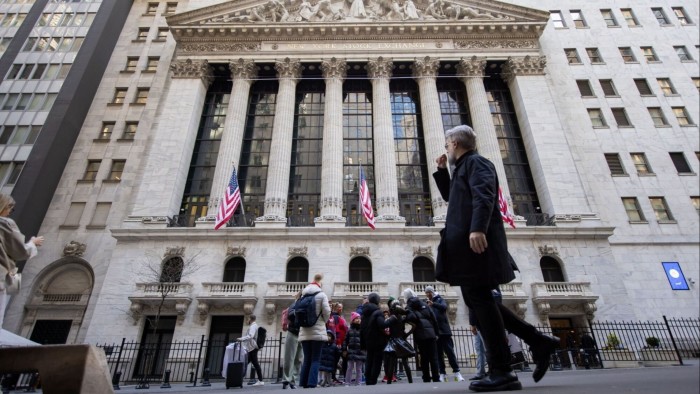Unlock the White House Watch newsletter for free
Your guide to what the 2024 US election means for Washington and the world
You’ve got to give it to them: bankers are good salesmen. Despite a world of mayhem — in trade, geopolitics and markets, much of it caused by US President Donald Trump — the big Wall Street banks have all seen their stock bounce strongly over the past fortnight, as investors shrugged off an alarming spike in Treasury yields, lapped up the banks’ booming trading profits and bought the line that there are rosy times ahead.
They might just be right. In aggregate, JPMorgan, Goldman Sachs, Morgan Stanley, Bank of America and Citigroup together made nearly $37bn of trading revenue in the first quarter of the year. For the first portion of that period — up to the February 19 peak of the S&P 500 — bullish equities trades pulled in the fees at a frenetic pace; from then on, it was a more fearful, but no less profitable, trading trend that supported revenue. “The business is performing very well,” David Solomon, Goldman Sachs’ inimitably bullish boss, told analysts, when asked if that trend had continued past the bank’s quarter-end and into April. “Clients are [still] very active.”
Analysts may have cut back some of their overweight recommendations for banks as Wall Street’s optimism in January that Trump would mean deregulation, tax cuts and a booming economy, gave way to dismay that the president was ushering in a recession.
But there’s still a confidence that “volatility and value” will sustain trading revenues through 2025 and drive up bank stocks, says Morgan Stanley banks analyst Betsy Graseck.
More fundamentally, Trump’s chaotic tariff communications, and the damage they have done to the dollar, equity markets and normally bulletproof Treasuries, may have bolstered the chances and urgency of promised deregulation. And that is not priced into bank stocks. “The market is pricing what’s happening today,” says Graseck. “This is not a look-forward market.”
JPMorgan chief Jamie Dimon spun a shrewd line, spelling out the systemic link between regulatory reform and a Treasury market that market-making banks would better be able to protect from extreme volatility. “Remember, [deregulation] is not relief to the banks, it’s relief to the markets,” he said as he presented first-quarter results. It could also make it more attractive for banks to bolster their own investment allocation to Treasuries.
So what kind of deregulation are we talking about? Federal Reserve chair Jay Powell told a February Congress committee meeting that “it’s time” to reform the so-called supplementary leverage ratio. That could involve stripping out Treasuries from the SLR’s total asset number, or lowering the minimum ratio. Analysts believe such a change could take effect before the end of the year.
Dimon said that might help some banks, though to make a real difference there would need to be a fix for the “deep flaws” of other capital, liquidity and stress test requirements, too. Solomon, meanwhile, expressed confidence that broad-based reform was coming, not just on the SLR. “I think there’s room for material tailwinds around capital,” he told analysts last week. “The messages I’m getting leave me optimistic that there will be progress.”
Dimon and Solomon are no random voices on the topic. Trump was influenced by both when he agreed to pause his “reciprocal” tariffs on the world on April 9 (Barely 48 hours earlier Dimon’s annual letter to shareholders had warned of inflation and recession risks; and Goldman had predicted a 45 per cent chance of recession.)
The Fed is a crucial conduit for deregulation. And while Powell has maintained a robust line on the sanctity of an independent monetary policy, he seems far more accommodating on bank rules. In addition to his enthusiasm for SLR reform, Powell said last week that a (further) watering down of the so-called Basel III Endgame — the US implementation of the latest global rule book on capital — would be ready “soon”. Michelle Bowman, Trump’s light-touch nominee as the Fed’s vice-chair for supervision, is set to be approved in the coming weeks.
The benign analysis of all this is that US banks would be freed up to support the economy and markets and offset short-term disruptive pressures. But there is a more cautionary reading, too: the loosening of rules for regional banks under Randy Quarles, Trump Mk 1’s appointee as Fed supervision boss, was a major contributing factor to the regional banks crisis of 2023. Swinging the pendulum from super-safe to reckless is in no one’s interest.
Read the full article here




